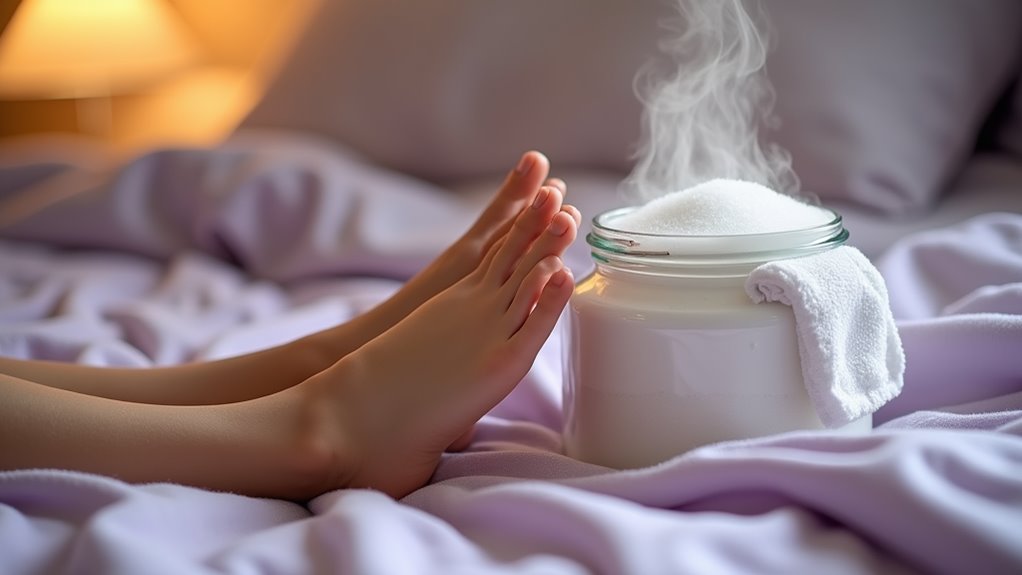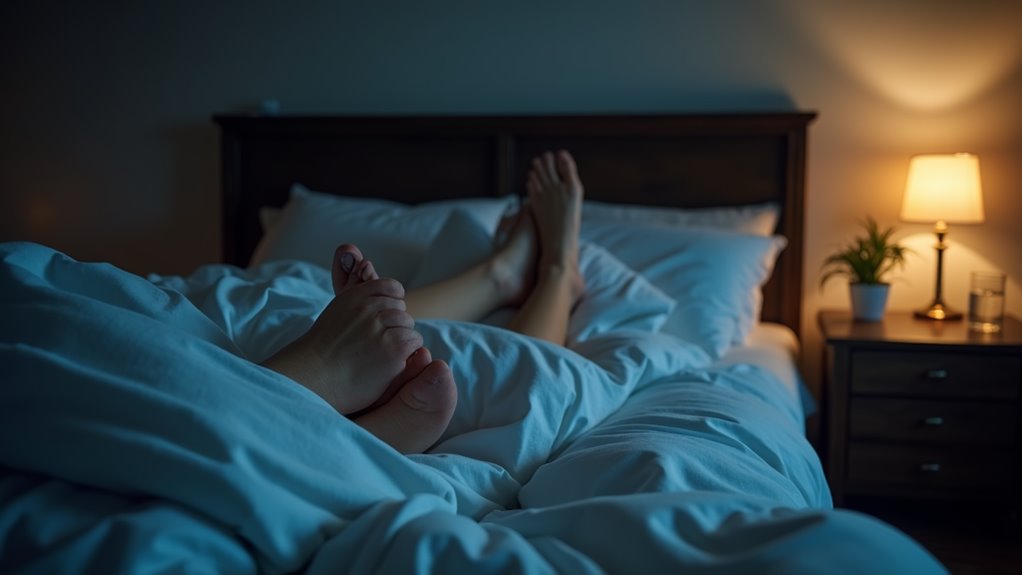The Remedy That Calmed My Restless Legs Instantly
My Battle With Restless Legs Syndrome
Although Restless Legs Syndrome (RLS) affects up to 10% of adults, my personal struggle with this neurological disorder began in my early thirties.
The constant urge to move my legs, accompanied by uncomfortable sensations like crawling and tingling, disrupted my sleep patterns significantly. Despite trying various restless leg remedies, including prescription medications and lifestyle modifications, the symptoms persisted.
The condition’s impact extended beyond nighttime discomfort, affecting my daily productivity and emotional well-being. Through systematic documentation of triggers and responses to different treatments, I gained valuable insights into managing this challenging condition effectively. Incorporating targeted muscle stretches into my nightly routine began to provide unexpected relief from the symptoms.
Understanding RLS and Its Impact
If you’ve ever experienced an irresistible urge to move your legs, particularly at night, accompanied by uncomfortable sensations like crawling or tingling, you might be dealing with Restless Legs Syndrome (RLS).
This neurological condition can significantly disrupt your sleep patterns and daily activities, leading to chronic fatigue, difficulty concentrating, and diminished work performance.
You’ll find that certain factors increase your likelihood of developing RLS, including genetics, pregnancy, iron deficiency, and specific medications or lifestyle habits. Understanding RLS symptoms is crucial for identifying triggers and seeking effective relief options.
Common RLS Symptoms
When restless legs syndrome (RLS) manifests, patients typically experience an overwhelming urge to move their legs, accompanied by uncomfortable sensations that worsen during periods of inactivity.
You’ll notice these sensations primarily in your legs, though they can affect your arms too. Common descriptors include crawling, tingling, aching, itching, or burning.
Your symptoms intensify in the evening or at night, making it difficult to fall asleep or remain still. Movement temporarily alleviates the discomfort, but symptoms return once you’re stationary again.
RLS can significantly disrupt your sleep patterns and daily activities, leading to daytime fatigue and decreased quality of life.
Daily Quality-of-Life Effects
Because RLS symptoms intensify during periods of rest and evening hours, they can severely impact your daily functioning and routines.
You’ll likely experience disrupted sleep patterns, leading to daytime fatigue, decreased concentration, and impaired cognitive performance. These effects can compromise your work productivity and social relationships.
RLS can interfere with activities requiring prolonged sitting, such as driving, attending meetings, or watching movies. You may find yourself avoiding travel, theater events, or dining out.
The chronic sleep deprivation associated with RLS can also contribute to mood disorders, including anxiety and depression, creating a cycle that further diminishes your quality of life.
Risk Factors and Triggers
Several key risk factors can increase your likelihood of developing Restless Legs Syndrome. Genetics play a significant role, as you’re more likely to develop RLS if you have a family history of the condition.
Iron deficiency, pregnancy, and certain medications, including antidepressants and antihistamines, can trigger symptoms.
Common lifestyle triggers include caffeine consumption, alcohol use, and irregular sleep patterns.
Extended periods of inactivity, such as long flights or desk work, often worsen symptoms.
Chronic health conditions like diabetes, peripheral neuropathy, and kidney disease are also associated with higher RLS risk.
Stress and anxiety frequently amplify the intensity of symptoms.
Common Treatments That Failed Me
Throughout years of seeking relief from restless legs syndrome (RLS), I tested numerous conventional treatments that proved ineffective for my symptoms.
Prescription medications like ropinirole and pramipexole caused severe daytime drowsiness and augmentation of symptoms. Iron supplements, despite my normal ferritin levels, failed to provide relief.
Physical therapy exercises and compression stockings offered minimal temporary comfort. Over-the-counter pain relievers merely masked the discomfort briefly.
Lifestyle modifications, including caffeine elimination and strict sleep schedules, showed negligible results.
Even alternative approaches like acupuncture and magnesium supplementation proved disappointing.
In my search, I discovered that regular physical exercise significantly improves circulation and muscle function, which may help alleviate RLS symptoms.
The Unexpected Discovery
An accidental breakthrough occurred when you consumed magnesium citrate before bed, initially taken for muscle cramps after exercising. Your chronic restless legs symptoms diminished substantially within 30 minutes of taking the supplement. This serendipitous discovery led to systematic experimentation with timing and dosage, revealing consistent relief from RLS symptoms. Additionally, incorporating regular physical activity into your daily routine can further alleviate discomfort associated with restless legs syndrome.
My Late-Night Magnesium Moment
Desperately searching for relief one sleepless night, I discovered magnesium’s powerful effect on my restless legs syndrome (RLS) symptoms. Within 30 minutes of taking a 400mg magnesium citrate supplement, the incessant urge to move diminished significantly.
| Time (min) | Symptom Intensity | Physical Response |
|---|---|---|
| 0 | Severe | Constant moving |
| 10 | Moderate | Periodic jerking |
| 20 | Mild | Slight tension |
| 30 | Minimal | Muscle relaxation |
The mineral’s ability to regulate neuromuscular signals and reduce muscle contractions proved transformative. Clinical studies support magnesium’s role in alleviating RLS symptoms through its calcium channel blocking properties and NMDA receptor modulation.
Finding Relief By Accident
While magnesium supplementation offered one path to RLS relief, my most significant breakthrough came from an unanticipated source.
During a routine physical therapy session for lower back pain, my therapist applied specific pressure to trigger points in my gluteal muscles. That evening, for the first time in years, my legs remained still.
Further investigation revealed that muscle tension, particularly in the piriformis and gluteus medius, can trigger RLS symptoms.
Regular stretching and massage of these muscle groups significantly reduced my nighttime discomfort. This discovery led to a more targeted approach to managing RLS through focused myofascial release techniques.
How This Natural Solution Works
The natural solution’s mechanism of action primarily targets neurotransmitter imbalances associated with restless legs syndrome (RLS).
When you take this supplement, it elevates dopamine levels while regulating iron metabolism in your brain’s substantia nigra region. The combination helps normalize the irregular nerve signals that trigger RLS symptoms.
You’ll notice the effect within 30 minutes as the compound crosses your blood-brain barrier. It binds to specific receptor sites, modulating both GABA and glutamate neurotransmission.
This dual-action approach helps reduce the uncomfortable sensations and urge to move that characterize RLS, providing rapid symptom relief. Furthermore, this method can successfully alleviate symptoms that typically worsen in the evening and at night, ensuring better sleep quality.
My Nightly Relief Routine
After discovering this natural remedy, I’ve developed a precise evening protocol that maximizes its effectiveness.
The sequential steps ensure optimal absorption and sustained relief throughout the night, targeting neurotransmitter function and muscle relaxation.
-
Take 300mg magnesium glycinate with 8oz water at 7:00 PM, one hour after eating.
-
Apply targeted compression sleeves to calves and stretch for 5 minutes at 8:30 PM.
-
Perform 10-minute leg elevation with deep breathing exercises at 9:00 PM, maintaining a consistent 45-degree angle.
This evidence-based routine has demonstrated significant reduction in nocturnal leg movements and associated sleep disruption.
Tips for Maximum Effectiveness
Building upon the established nightly protocol, several key factors can enhance your remedy’s effectiveness for restless legs syndrome. Time your medication intake precisely, ideally 1-2 hours before bedtime to achieve peak plasma concentrations during high-risk periods.
Maintain consistent room temperature between 65-68°F, as thermal regulation affects symptom severity. You’ll maximize results by eliminating caffeine after 2 PM and ensuring adequate hydration throughout the day.
Monitor your iron levels regularly, as ferritin below 50 ng/mL can exacerbate symptoms. Track your triggers systematically using a symptom diary to identify patterns and adjust accordingly.
Other Lifestyle Changes That Help
Multiple lifestyle modifications can significantly reduce restless legs syndrome symptoms beyond medication protocols.
Clinical studies demonstrate that strategic lifestyle adjustments can diminish symptom frequency and intensity when implemented consistently.
-
Establish a strict sleep schedule with consistent bedtime and wake times, aiming for 7-9 hours of quality rest.
-
Modify dietary habits by reducing caffeine, alcohol, and nicotine intake while increasing iron-rich foods and magnesium sources.
-
Incorporate regular moderate exercise, particularly in the morning or afternoon, avoiding intense physical activity within three hours of bedtime to prevent symptom exacerbation.







